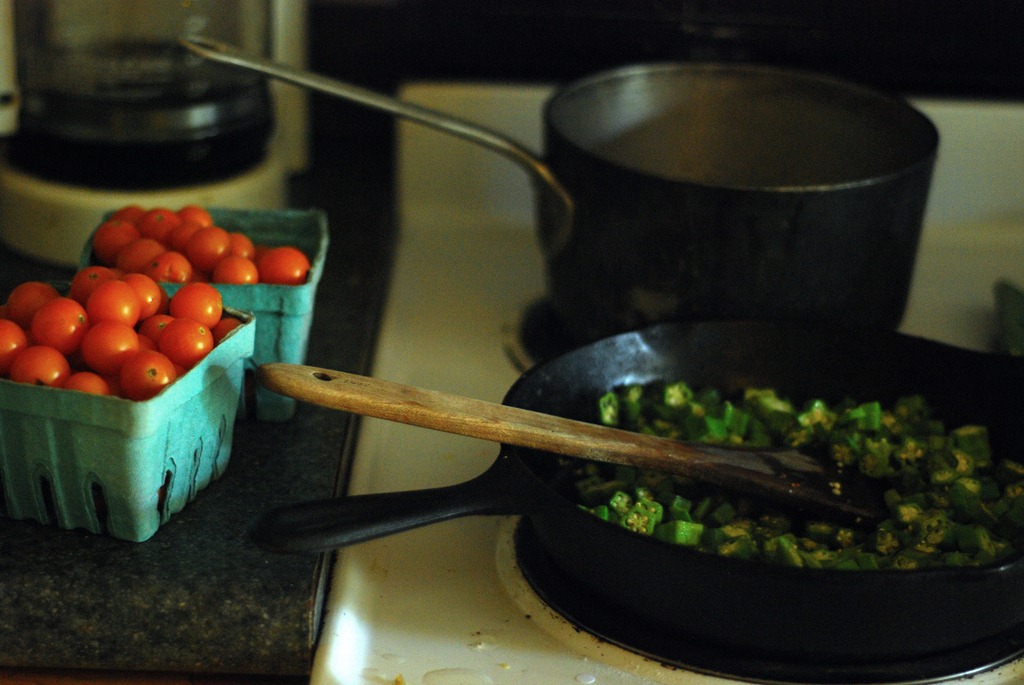My husband says I can get nostalgic about a paperclip, and he’s not far off. Something I’ve been missing like the dickens this summer? Okra. Oh man. It was a star crop for us at our old farm. I never ate it growing up except under great duress, but seven years on Virginia farms turned me into a card carrying okraphile. I guess there are northern varieties (farm and garden friends, please chime in and tell me what they are!!), but we don’t currently grow them at this farm. My husband tells me he’s been seeing some at market – it’s reasonable to ask him to bring me home five pounds next week, don’t you think?
The rest of this post is another that first appeared on our farm blog – hence the references to our being Southern farmers and to a time and place when we grew lots of this little emerald wonder. The recipe at the bottom, for braised okra with cherry tomatoes, is what I would be making this very second if I still had a 200-foot block of okra (or even just a plant or two) a short walk away. It’s dead easy and, more to the point, one of my very favorite things to eat ever. The original post also included recipes for the other things I love to make with okra: lacto-fermented okra pickles, our favorite fried okra, and my husband’s gumbo. I’ll probably bring them on over here too, soon enough.
(Insert Wayne’ World Scooby Doo ending sound here. Boom! It’s two years ago, and you’re sitting on our back porch in Virginia sipping a beer while I finish cooking dinner.)
Confession: we are vegetable farmers, and we are Southern, and until recently I just didn’t like okra very much. It’s not that I found it offensive exactly. I was always happy enough to eat it in my husband’s gumbo, where, in his deft hands and alongside a rich roux and some smoky spices, its infamous slime is somehow alchemized into a velvety sauce. In a gumbo the okra itself almost disappears, which makes it quite easy to tolerate. I also tried frying it, over and over again. It was always okay. It was certainly pretty to look at, and I felt I must be doing my body a favor by eating it, even if I had to choke it down. I always felt virtuous eating okra, but I never had very much fun.
With apologies to the many awesome lunch ladies I have known, I am pretty sure the cafeteria at South Columbia Elementary School in Martinez, Georgia, circa 1984, is to blame. I remember dreary piles of the stuff, breaded and steamed and slumping forlornly, almost apologetically, in its compartment of the brownish melamine lunch tray. I looked at its dusty breading and its drab interior, utterly unconvinced, and occasionally gave it a nudge with my fork. It yielded immediately, like pudding, and slid right back off the fork. We got off on the wrong foot, okra and me, and I’m afraid now that I wasted more than twenty-five years holding a grudge.
Because this summer? I’m on an okra bender. I’m not sure what changed for me, exactly. We’re growing okra again after a hiatus of several years; perhaps I see those gorgeous plants with their flowers like delicate ivory trumpets and I just want to do right by them. Maybe something clicked for me when my husband said, “I love okra because it’s the most vegetable-y of our vegetables.” He’s right: when you cook it right, okra’s flavor is green and clean and bright, the very essence of fresh. Maybe it’s because now, as a mother, I don’t want to waste any more time being virtuous. What I want is joy at the table, a strong body and a curious mind and an open heart, a rich family life. I swear I’m finding all that in okra.
Some quick notes, and then a recipe.
Storing okra: Keep your okra in a plastic or paper bag in the fridge, unwashed, and use it within a few days.
Using okra: Please don’t bread it and then steam it. You could steam it very gently, just till bright green and still with some snap to it, and then eat it warm, drizzled with butter and a squeeze of lemon juice, or chilled, dressed with a bright vinaigrette. Try it breaded and fried, braised, pickled, skewered and grilled, in stews, in curries, in place of squash or zucchini in ratatouille.
A word about okra slime: In Vegetarian Cooking for Everyone, Deborah Madison writes, “Okra is slimy, and rather than try to ignore this fact, perhaps it’s best just to admit that’s how things are.” Maybe that’s what changed for me this summer. I’m not trying to wish the slime away anymore. Instead, I’ve learned how to make it work in a dish’s favor. In our favorite fried okra, it binds with a cornmeal and parmesan coating to create a perfect golden crust. In our okra and tomato braise, it thickens the juices of burst cherry tomatoes and makes the most lovely sauce. And of course it’s essential for thickening up gumbo. Maybe thinking about it this way will help you, too.
Braised Okra with Cherry Tomatoes
(serves 4-6, unless you eat like we do, in which case: serves 2)
This recipe comes to us from our friend and former CSA host Noell. Don’t be fooled by its apparent plainness: this belongs in everyone’s summer arsenal. It’s amazing eaten straight from the skillet, and pretty darn good eaten straight from the fridge as well. It’s wonderful on top of quinoa and other grains, and it makes a great wrap or burrito filling. Every time I take a bite I grin.
Quantities are approximate. Use roughly equal amounts of okra and cherry tomatoes, and garlic to taste.
1 lb okra
1 lb cherry tomatoes
3-4 cloves garlic (or to taste), chopped
olive oil, salt & pepper
Warm a few tablespoons olive oil in a large skillet over medium-high heat. Meanwhile, trim off the okra stems and then slice in half lengthwise, or slice into 1/4-inch rounds. When the skillet is ready, add the okra and the chopped garlic. Saute for about 10 minutes, flipping occasionally, until the okra begins to brown. Add the cherry tomatoes, and salt and pepper to taste, and cover. Braise 5-10 minutes, checking every few minutes. The dish is done when most of the cherry tomatoes have burst.


